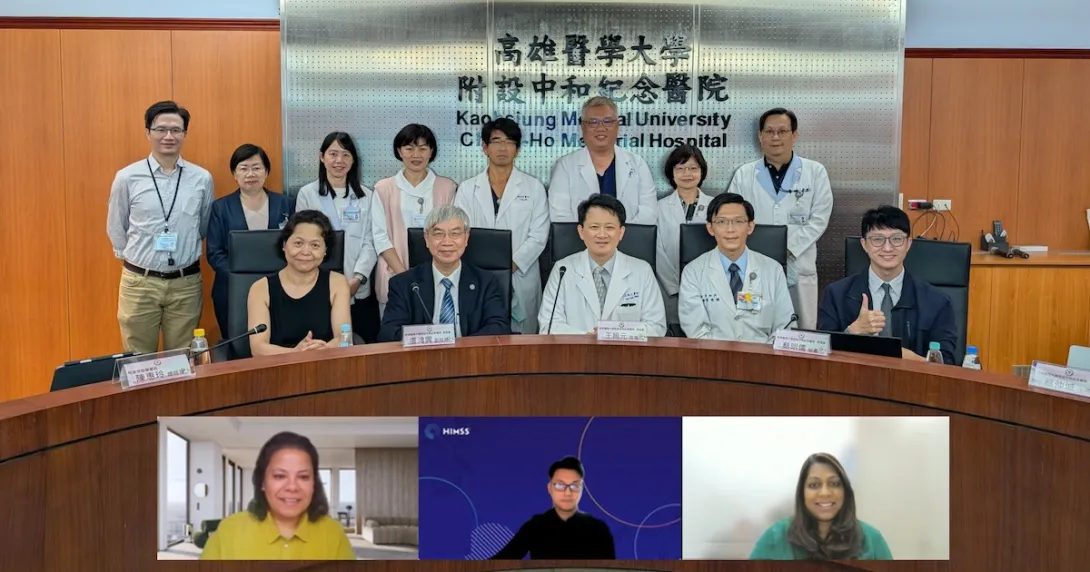
Photo courtesy of Kaohsiung Medical University Chung-Ho Memorial Hospital
Kaohsiung Medical University Chung-Ho Memorial Hospital (KMUH) has been validated at Stage 7 of the HIMSS Electronic Medical Record Adoption Model.
The eight-stage model measures an organisation's effective use and deployment of EMR technology.
PREPARATION
KMUH's digital transformation is guided by its six strategic pillars, or what is referred to as the "6I" vision: integration, innovation, intelligence, internationalisation, impact, and integrity.
The hospital took a phased approach in preparing for the Stage 7 validation. It strengthened its EMR system, improved interoperability, implemented patient-facing digital tools, and embedded AI-powered clinical decision support into workflows.
It has also applied AI models for early deterioration detection, ICU workload prediction, rehabilitation coordination, and pharmacogenomic decision support. The hospital's erythropoiesis-stimulating agents (ESA) model outperformed clinicians in triage, and predictive tools have reduced response times and optimised resources.
KMUH now supports cloud-based exchange with community partners using FHIR standards and integrates National Health Insurance data via web services. Its telemedicine outpatient system features seamless scheduling, test result sharing, and documentation, which are all integrated into the HIS and support continuity of care in remote regions.
MAJOR CHALLENGES
This preparation, however, was met with challenges, particularly around work culture and data governance.
"One of the main challenges was cultural: engaging clinicians and staff to adopt new digital tools consistently in their daily practice. We addressed this through continuous education, leadership engagement, and by demonstrating tangible improvements in efficiency and patient safety," KMUH professor and superintendent Dr Jaw-Yuan Wang shared in an interview with Healthcare IT News.
"Another challenge was data governance—ensuring data accuracy, quality, and security across systems. We established a hospital-wide data governance framework and multidisciplinary task forces to monitor progress and resolve issues in real time," he added.
OUTCOMES
During its validation, KMUH showcased its Intelligent Decision Support System for antithrombotic medications, developed over two years from 2022 to provide clinical decision support and reminders.
"[Previously,] our hospital lacked a unified guideline and integrated information platform," the superintendent said. "Physicians had to manually check cloud-based medication records and assess bleeding risk on their own, often resulting in omissions that could lead to intraoperative bleeding or postoperative thromboembolic events."
Following the implementation of the smart system, the hospital observed huge improvements: it hit a full 100% preoperative antithrombotic medication rate from 63%, the accuracy of stop-medication instructions dramatically increased from 38.3% to 93.3%, and the rate of medication reintroduction by the third postoperative day increased considerably from 46.1% to 90.0%.
HIMSS validators also noted KMUH's trauma ecosystem revamp following the 2014 Kaohsiung gas explosions. "The project exemplified how clinical realities, public-private partnerships, and civic technology co-created a scalable, interoperable emergency response platform, recognised nationally."
"Since meeting the requirements for Stage 7 EMRAM, we have observed significant gains across clinical, operational, and patient engagement outcomes. Clinically, we reduced medication errors through closed-loop administration, detected patient deterioration earlier with AI-enhanced early warning systems, and improved adherence to guidelines via real-time decision support," Dr Wang said.
"Operationally, we achieved faster diagnostic turnaround, optimised bed management, and strengthened data analytics for strategic planning, while on the patient side, we saw greater empowerment through digital health apps, portals, and telemedicine," the superintendent added.
THE LARGER TREND
KMUH is the first hospital in Southern Taiwan to be validated for Stage 7 of the EMRAM, following a similar milestone achievement for Stage 6. It is now also the seventh hospital in Taiwan to be validated at Stage 7 of the EMRAM. Others on this growing list include Tungs' Taichung MetroHarbor Hospital, Taichung Veterans General Hospital, Chang Gung Memorial Hospital, Linkou, China Medical University Hospital, Changhua Christian Hospital, and Far Eastern Memorial Hospital.
"Our next steps include expanding our use of AI and predictive analytics to support precision medicine and population health management; strengthening patient engagement platforms (patient-reported outcome measures), ensuring accessibility and usability for all patient groups; and enhancing cybersecurity and data governance to maintain trust and resilience in our digital ecosystem," Prof Wang said.
Moreover, KMUH will pursue more HIMSS digital maturity validations, particularly the Infrastructure Adoption Model and the Analytics Maturity Assessment Model.
ON THE RECORD
Image
"Achieving Stage 7 of the HIMSS EMRAM is a landmark accomplishment for Kaohsiung Medical University Chung-Ho Memorial Hospital. As a leading academic medical centre in southern Taiwan, this recognition validates our commitment to digital excellence, patient safety, and innovation in healthcare delivery. It signifies that we have successfully transitioned to a fully paperless environment, with advanced clinical decision support, closed-loop medication administration, and data-driven quality improvement integrated into our daily practice."
Professor Jaw-Yuan Wang, MD, PhD, Superintendent, Kaohsiung Medical University Chung-Ho Memorial Hospital